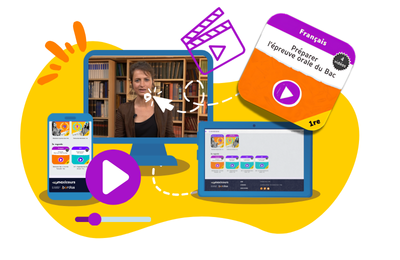Matilda by Roald Dahl
- Fiche de cours
- Quiz et exercices
- Vidéos et podcasts
- Découvrir un aspect de la thématique d'étude l'initiation, l'apprentissage
- Approfondir ses connaissances sur le roman de Roald Dahl, Matilda
- Matilda Wormwood est la protagoniste d'un roman d'apprentissage pour enfant de Roald Dahl.
- Douée de télékinésie, la petite fille est intelligente et attachante, mais différente des autres enfants et délaissée par ses parents.
- Le monde des adultes auquel Matilda est
confronté est dominé par le mal :
- son père et son frère sont des escrocs
- la directrice de l'école est avide d'argent et de pouvoir
- L'amour et l'affection n'entre dans son monde que grâce à son institutrice.
- Malgré tout, le récit est très comique, et les valeurs positives prédominent à la fin : loyauté, amour, justice.
Matilda is a book for children written by British writer Roald Dahl in 1988. It deals with Matilda Wormwood, a very clever girl whose adventures fill the reader with joy. Matilda can be considered as an apprenticeship novel in the sense that it concentrates on Matilda’s youth and her social and moral motivations in life.
The story takes place in a Buckinghamshire village. There, lives Matilda, a five and a half year old girl, with her parents who neglect her and whom she does not like much. Matilda is different from the other children she goes to school with, she learnt to read when she was 4, has read a lot since and she is gifted with telekinesis: she can move objects without touching them.
At school, Matilda is confronted to two adults, her teacher Miss Honey whom she likes a lot because she is soft and gentle and who is amazed at Matilda’s abilities, and Miss Agatha Trunchbull the headmistress, a tyrannical woman who likes to terrorize her students. Miss Trunchbull hates everybody even Miss Honey who is in fact her niece. She raised her and she keeps her parents’ money so Miss Honey has to live in poverty in a derelict house.
Thanks to her powers, Matilda finally manages to frighten Miss Trunchbull so much that she leaves the region after handing over her niece what belongs to her, her house and her money.
As for Matilda’s parents they must leave the country too because the police want to arrest them for selling stolen cars. As Matilda refuses to go with them she asks Miss Honey if she can live with her and as the school teacher accepts, both are pleased with this happy ending.
Very early Matilda discovers that the world she lives in
is not a good world as evil dominates. She is
confronted to the pangs of life in her early childhood.
Her parents hate her and his father and brother are
crooks, Miss Trunchbull is greedy and is only
interested in money and power, whatever the means to get
them.
There seems to be no love or affection in her life until
she meets Miss Honey. Indeed, only her schoolteacher
cares for her and as the story goes a strong bond
develops between them. Both are solitary characters who
need love.
In spite of the hardships of life she has to face,
Matilda is able to overcome them as she is different from
a normal child. Her intelligence is so great that she has
no difficulty, though very young, finding the proper
reactions to what happens to her.
Of course it is always comical and we must not
forget that Matilda is first and foremost a book
for children. Even Miss Trunchbull can be considered
as a comical character as she often throws children in
the same way as she used to throw the hammer in
the Munich Olympics. But her early years must
lay the foundations for her future years so no wonder
punishment, corruption, evil, hate or greed occupy an
important part in the story. Luckily, they are beaten in
the end and they are replaced by positive values
such as loyalty, reward, justice and love.
Though written for children everybody can read Matilda, whatever the age, as it is a story about the relationships between people. As often Roald Dahl chooses a young hero to show how difficult life is and how cruel adults can reveal themselves sometimes. Matilda is, like Oliver Twist (Charles Dickens, 1838) or David Copperfield (Charles Dickens, 1850), a novel based on childhood and it teaches us how difficult it is for a child to grow up when you are surrounded by evil characters.

Des quiz et exercices pour mieux assimiler sa leçon
La plateforme de soutien scolaire en ligne myMaxicours propose des quiz et exercices en accompagnement de chaque fiche de cours. Les exercices permettent de vérifier si la leçon est bien comprise ou s’il reste encore des notions à revoir.

Des exercices variés pour ne pas s’ennuyer
Les exercices se déclinent sous toutes leurs formes sur myMaxicours ! Selon la matière et la classe étudiées, retrouvez des dictées, des mots à relier ou encore des phrases à compléter, mais aussi des textes à trous et bien d’autres formats !
Dans les classes de primaire, l’accent est mis sur des exercices illustrés très ludiques pour motiver les plus jeunes.

Des quiz pour une évaluation en direct
Les quiz et exercices permettent d’avoir un retour immédiat sur la bonne compréhension du cours. Une fois toutes les réponses communiquées, le résultat s’affiche à l’écran et permet à l’élève de se situer immédiatement.
myMaxicours offre des solutions efficaces de révision grâce aux fiches de cours et aux exercices associés. L’élève se rassure pour le prochain examen en testant ses connaissances au préalable.

Des vidéos et des podcasts pour apprendre différemment
Certains élèves ont une mémoire visuelle quand d’autres ont plutôt une mémoire auditive. myMaxicours s’adapte à tous les enfants et adolescents pour leur proposer un apprentissage serein et efficace.
Découvrez de nombreuses vidéos et podcasts en complément des fiches de cours et des exercices pour une année scolaire au top !

Des podcasts pour les révisions
La plateforme de soutien scolaire en ligne myMaxicours propose des podcasts de révision pour toutes les classes à examen : troisième, première et terminale.
Les ados peuvent écouter les différents cours afin de mieux les mémoriser en préparation de leurs examens. Des fiches de cours de différentes matières sont disponibles en podcasts ainsi qu’une préparation au grand oral avec de nombreux conseils pratiques.

Des vidéos de cours pour comprendre en image
Des vidéos de cours illustrent les notions principales à retenir et complètent les fiches de cours. De quoi réviser sa prochaine évaluation ou son prochain examen en toute confiance !








